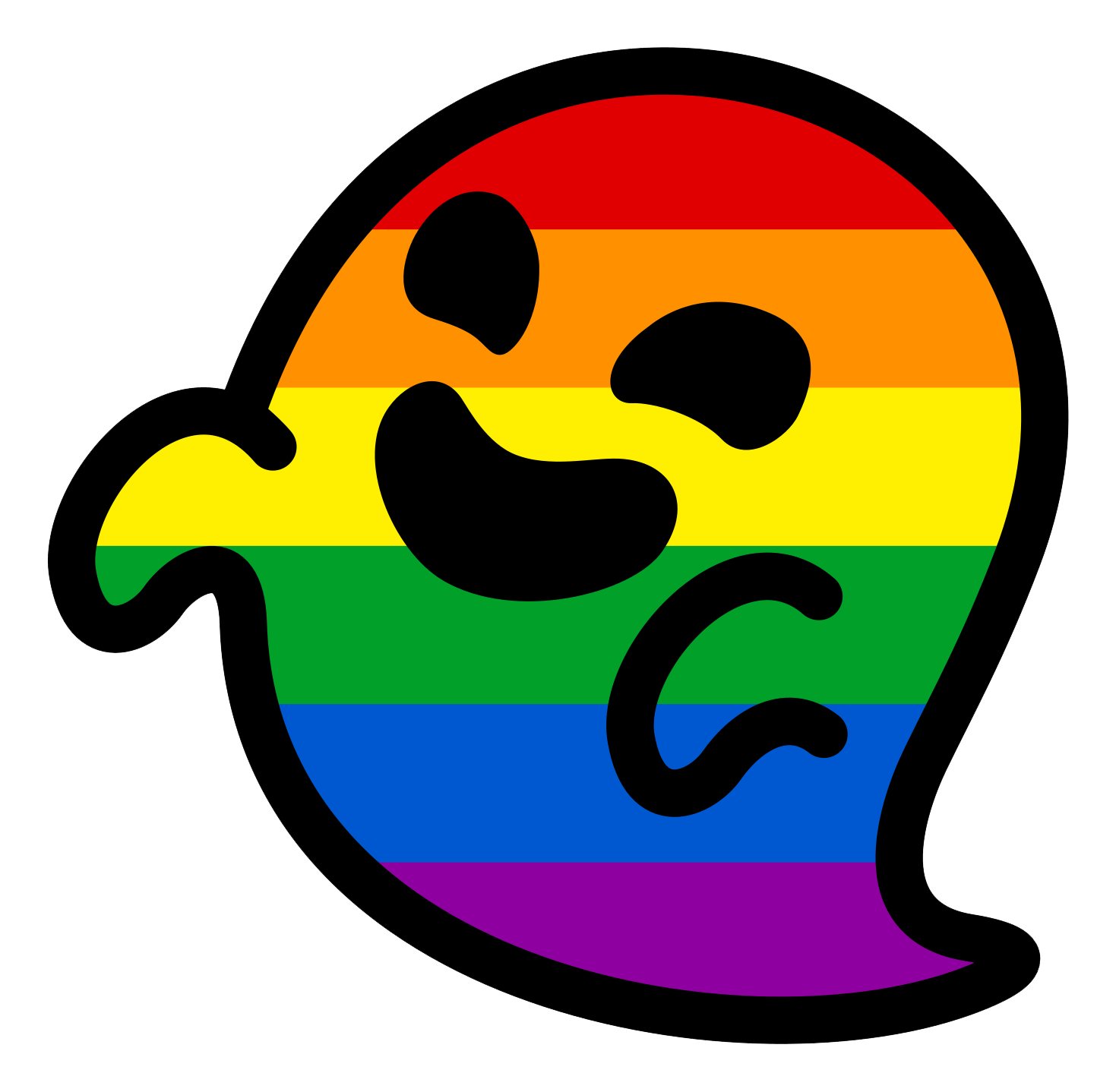I was kind of passively monogamous until hooking up with a polyamorous woman on Tinder. I started a relationship with her and even though I made some attempts at dating other people, this mostly just became her having sex with other guys and me being involved with her exclusively. But I found out that I have zero jealousy, like none at all, as long as she had the time and attention for me. I found out a lot about myself that I didn't expect.
So, anyway, I wanted to create a thread about positive experiences with polyamory, due to a thread on the test instance.
i got unanimously invited into a trans polycule once, i declined because thats not my speed (im so needy and need a person to devote all their time to me :sicko-fem: ), but theyre cute, have 8 people all living in a fairly big house because they all contributed to the deposit, which i doubt would have been possible if they were pairing off. has sort of mini-commune vibes to it.
there was a fun tea party that they invited me to where i got to talk about marxism to them while some lady was getting fucked in the ass on a table
Man, I would like to rail a woman's ass during a Marxism lecture. Yes, yes, :spray-bottle:.
tbh i sometimes feel like my life is straight up what :jordan-eboy-peterson: would warn you about tearfully
My buddy and I were romantic partners for a few years, poly all the while, then split up but kept living together and being best friends. Now we refer to each other as "my flatmate" or "my queerplatonic partner" depending on who's listening and kiss each other goodnight. Polyamory made this switch emotionally viable.
I wish I could be friends with my ex, they're super monogamous but I never was except for that relationship. I still think we'd be good friends but obviously the emotional wounds for them are a little more intense and maybe it's because of the monogamy.
I've always been super monogamous but I get what you mean. I've been cheated on and I was surprised to realize that the only part that really bothered me was the lying. Like you, I experienced almost no jealousy over the act. In all honesty, I was a little bit relieved to realize that that's what was causing the distance toward the end.
Up to and including our brief fling, I would describe the two of us as acquaintances at best - neighbors who decided to try dating for a little bit. The conversation we had when I confronted her was the start of a decade-long friendship that's still going strong. She gets back to the US later this month and I'm excited to catch up.
While this isn't a polyamory success story, there was never a moment of bitterness that followed once we had an honest talk. To me, that relationship proved that honesty is the only part that really matters. The rest is negotiable.
I'm friends with a poly married couple. They each have boyfriends and go on cute dates in groups. It works really well for them.
After years of loneliness I found myself dating a lovely man last April. We started spending a lot of time with a mutual friend of ours, a woman who had been sorta flirty with me in the past. Around July, after a lot of really comfy and increasingly intimate times, things evolved into a throuple-type situation. None of us had ever done anything like this before, so there was a bit of a learning curve in many ways, but far far outweighed by many many wonderful times. I feel so blessed that things worked out so well :)
polyamory works really well for me because it means i can date people who aren't strictly sex repulsed aces like me :)
not having to worry about having to fulfill every need of your partner is really nice imo
how do you manage feeling jealous about their attention towards you waning as they spend time with other people
like idk when someone makes sure to say good night to you every night for a few months and then suddenly doesn't it's a little easier to deal with if they're just busy and less so if they're maybe busy with another person
how to deal with the feeling that a person's attention towards me is waning because I'm less interesting or others are more interesting or better than me or loved more
I got forwarded some poetry that a person read to another person and it's like. "oh, that's what you've been doing, i thought reading to each other was our thing" how do I not be that way and just enjoy that it was shared with me and not feel jealous about it
any tips on dealing with jealous feelings about a person who was monogamous with like two people who treated her terribly but is like insisting on polyamory with you and it's like "what did they have that I don't"
Poly isn't for everyone. It sounds like you might not ever be comfortable with it, or it might just take time, talking and thinking to change your perspective.
Personally I don't care how my partner spends their time. It doesn't matter if it's knitting or fucking.
If you aren't getting enough time with your partner to meet your needs you should talk to them about it or look for someone that will meet your needs.
Comparing yourself to past or other relationships is never gonna feel good. Each relationship (including platonic) you have with someone is special and different in its own way, isn't it?
There is the hand holds the sword. If you partner is having a great time with a new partner that is normal. You will not often be as fun as a new experience. That's fine. It is a moment to be happy. They couldn't enjoy that new partner with safety and comfort without you providing support and structure. The specific name of the new emotion we don't learn in straight society is compursion. For the rest it comes with time. My partner start with the same concern so we started real slow. It eventually worked out.
I'm bipolar and my sex drive varies with my phases. I'm essentially ace when depressed, which deprives my partners of sex as well as romance due to feeling shitty.
And when I'm manic, my sex drive is ridiculously high and potentially unreasonable for most partners. I can also generally be a bit much while manic.
Poly life makes this a lot easier on myself and my partners. I'm also queer and pan so there's the typical queer liberation and anti family unit reasonings.
None of my own, but I know a poly couple who have been together for 17 years and they're still all over eachother like teens. Recently been introduced to a load of polyamourous people after finding a kind of art commune for my partner to work at. Being around other creative people helps her a lot.
Cool if you're into it, but I have enough trouble scheduling out my week involving just 2 people and I am terribly insecure.
Humans don't really have a nature as such. However monogamy is a learned behavior, so poly is just as natural we just don't have the skills and language associated with it in the same way.
I have been poly for years and years now. The way it mostly works is that we will have occasional flings. So in effect we look like a regular cis het monogamous couple that cheats occasionally. Which is thr most normal form of polyamoury. we just talk about it and make sure that every is feeling happy and taken care of. It's both nicer and less energy than monogamy.
This may be a super dumb question or ignorant perspective, idk. And I absolutely believe poly lifestyles work super well for certain people. Though I’m wondering if there may be a connection between the recent rise of poly relationships and the endless fracturing of attention spans, consumer identities, and general atomization.
Capital has sought to slice people in so many ways and force people to define their identities based on the sort of mental/physical/social states they weave in and out of, as a vehicle to secure individual consumer identities through those avenues. It’s easier to sell to/control one person in five ways than 10000 people etc.
And so this may not make any sense at all, and I hope it’s not taken in an offensive way or anything because that’s totally not my intent. But if there are a lot of people economically and thereafter socially trained/reinforced to say “I am this specific thing, this way, some of the time when I’m like x, but other times when I’m like y, I am this different specific thing,” etc. Which I think you could argue has roots as a natural human phenomenon of course, but it can be refined and extremefied in non-natural ways (in service of profit ecosystems).
I think this process has been churning on people more and more over the last however many years, especially lately, always increasing, always seeking to break people into even more individual shards within shards to sell to, and I think that fits just like weirdly conveniently well with the recent rise of interest in poly relationships.
You don’t have to commit to one thing, you can service different versions of yourself with different people, you don’t have to tie yourself down because there’s always an out/other options/other people. Idk I’m just seeing a lot of parallels of splitting yourself into different economic personas lining up with a sort of polyamorous splitting of oneself in the same way with different people romantically. Almost like poly being the relationship version of zoomer screen-in-screen videos lol. Is this thought really off or something though
I can see how you could make this kind of analysis but I think there are a few of issues in how you're conceptualising things. Sorry for the long post, but you seemed to be genuinely asking a question and so I wanted to try and answer it as best I could.
In my opinion, there are two basic problems in your analysis. The first is that you're imagining that there's a largely one-way process in which capitalism determines people's desires/identities, so that as capitalism develops people's identities become more and more fragmentary. I'd argue that this process gets things the wrong way around, and does so in a way that both gives capitalism too much credit as a progressive social force and effaces how society is actually transformed by the radical demands/movements of minorities, workers, etc. For example, corporations have begun to use branding based on the successes of social movements like the queer liberation movement and the civil rights movement to sell products, and the media is increasingly fragmented as new technologies allow for the production and distribution of more and more targeted products. You could argue that this is capitalism creating new niche identities. However, more realistically, what is happening is that capitalism is responding to identities that already exist in various forms and to the success of movements have won certain battles for social recognition and legal rights. It this seeks to incorporate these identities into the circuits of capital - which both opens up new avenues for profit, but also is an attempt to control and shape them in certain ways that are beneficial to capital, just as it does with all identities and all things. Ultimately, though people are really fragmentary just because they are people. Your race, gender, class, sexuality, mental and physical capacities , etc. are all going to intersect in different ways and in ways that create tensions within yourself. Of course, these identities are social constructions, but they are also real. I think perhaps it's useful to try get away from the idea of the self as a coherent whole and to accept that we are all multiple people and work from there.
And I think that this kind of leads into the second problem, that you're implicitly imagining a kind of nature/culture opposition in which the thing that feels natural to you - because you grew up in a monogamous culture - appears to be being changed by capitalism, while overlooking that this thing is itself only a historical and culturally-specific norm. That is not to say that polyamory is anymore 'natural', just that, as I read it, your analysis implicitly codes polyamory as a negative transformation due to seeing it being brought about by contemporary capitalism and the effects of the attention economy. On a less conceptual level, I also think you're kind of misunderstanding what poly relationships are like. It's not just hook-ups, they're basically exactly the same as monogamous relationships, except with more orgies and when you meet someone else that you have a deep connection with, you don't have to make a decision on whether to break up with your current partner. The stuff you describe with attention, etc. is just as applicable to monogamous dating, if not more so, because you have to end one relationship to start another.
In my view, a lot of the contemporary popularity of poly relationships is ultimately the result of the successes of queer liberation, which although it failed to challenge capitalism as an economic system (and was it reasonable/realistic really to ever expect it to do this?!), has been incredibly successful in breaking down the absolute hegemony of hetero-normative social forms. It's not a surprise imo that most of the people I know in poly relationships are queer. However, I do think that there are certain ways of reading the growth of polyamory in terms of the effects of capitalism that avoid an implicitly negative coding. The most obvious one is how unaffordable housing has become and also how difficult just surviving is now unless you're on a really good income. This has had really obvious effects on how people live and how we organise ourselves socially. Many people end up living with housemates until a much later time in their lives than they would have previously, and many people are unable to start families (or just don't see it as desirable). That this opens up a lot more space for thinking about what they want their relationships to look/how they want to live is kind of silver-lining imo
Wow this is so clear and helpful. Thank you so much for writing such a thorough response. I think everything you said makes a lot of sense
My wife and I have always held the door open for the potential of her dating a woman since she's bi, and the only hangup for me was if she wanted to date a man / make me feel replaced. Fast forward a bit and we have a number of nonmonogamous friends and we agree that's a possibility but don't really act on it. Fast forward more and she meets a guy who is very much like me lol but thinks he's amazing. We have a hard transitionary period with a lot of big feelings (anger, fear, sadness) but now we're in a pretty good place: we're communicating more and more honestly, when we spend time together it's because we're choosing to not because it's the only/default option, I'm going on dates and she's seeing this guy and they're super cute together. When someone's upset there's often more people around to help. Even before we opened up, we learned a lot about healthy relationships from our polyamorous friends. The monogamy sold to us by tv, movies, jewelry commercials, reality tv, religion, and our parents is not exactly a super healthy way to live.
Highly recommend for anyone looking into things, or even for monogamous people trying to improve their relationship are the Multiamory podcast and the PolySecure book. It sounds specific but it's really about communication and attachment styles.
I have a couple of poly friends who have been in a relationship for over a decade now. It works great for them and honestly has really changed how I understand relationships as well. They have had numerous other partners (both individual and shared) during the time I've known them and overall it seems to work really well. Most of the people who have been in their polycule remain close friends and it's been nice seeing how much emotional support they all give each other. Obviously they fight sometimes and there is still the pain that any relationship involves when people get into arguments or are inconsiderate of each other, but that's just part of relationship in general. Honestly, the fact that they have other people in the relationship to provide them support and to help mediate is actually kind of great, and I think removes a lot of the fear involved in
I'm happy that you're doing well. Being in poly/open relationships often isn't easy, as we're all more or less socialised into monogamy. Being able to feel joy for someone you love in a non-possessive way is a radical kind of love and speaks really well of you imo
Friends of mine are parenting a child as a poly cule of 4-5 people and the child did turn out well, for the sibling we have to see that.
Honestly it really does take a village if you don't want people to burn out.
was in a long distance polyam relationship for almost a decade, starting when I was a teen on the net (do not recommend this particular part - I was very lucky that everyone was who they said they were). Became very short distance with a couple of em, eventually fell out of love with all of em (as is fairly typical for teen romances that last that long). Happy to still call some of them my best friends, also fine knowing that I'll never see others again.






